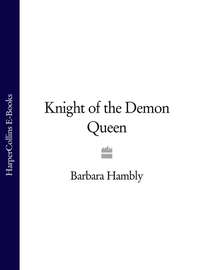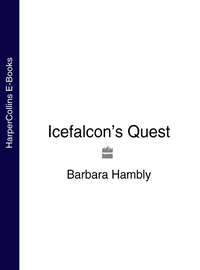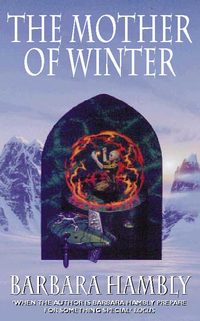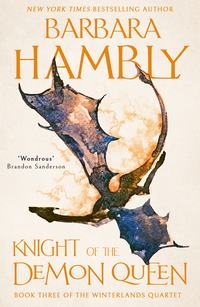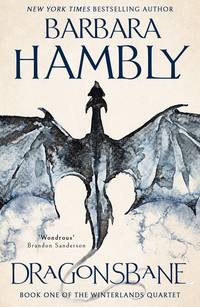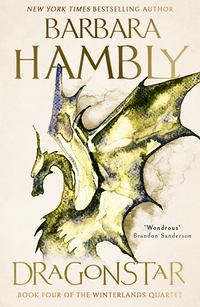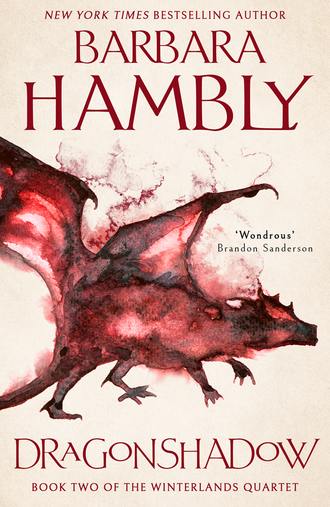
Полная версия
Dragonshadow
“Only a dozen or so are on the list,” said Jenny quietly. “There must be dozens—hundreds—that are not.”
“Aye.” He moved two of the harpoons, a restless gesture, not meeting her eyes. “We don’t even know how many dragons there are in the world, or where they live—or what they eat, for that matter, when they’re not makin’ free with our herds.” His voice was deep, like scuffed brown velvet; Jenny could sense him drawing in on himself, gathering himself for the fight. “In Gantering Pellus’ The Encyclopedia of Everything in the Material World it says they live in volcanoes that are crowned with ice, but then again Gantering Pellus also says bears are born shapeless like dough and licked into shape by their fathers. I near got meself killed when I was fifteen, findin’ out how much he didn’t know about bears. The Liever Draiken has it that dragons come down from the north …”
“Will you want a troop of men to help you?” asked Borin. In the short time he’d been at the Hold he’d already learned that when the Thane of the Winterlands started on ancient writings it was better to simply interrupt if one wanted anything done. “Commander Rocklys said she could dispatch one to meet you at Skep Dhû.”
John hesitated, then said, “Better not. Or at least, have ’em come, but no nearer than Wormwood Ford. There’s a reason them old heroes are always riding up on the dragon’s lair by themselves, son. Dragons listen, even in their sleep. Just three or four men, they’ll hear ’em coming, miles off, and be in the air by the time company arrives. If a dragon gets in the air, the man going after it is dead. You have to take ’em on the ground.”
“Oh.” Borin tried hard to look unconcerned about this piece of news. “I see.”
“At a guess,” John added thoughtfully, “the thing’s laired up in the ravines on the northwest side of the Skepping Hills, near where the herd was pastured. There’s only one or two ravines large enough to take a dragon. It shouldn’t be hard to figure out which. And then,” he said grimly, “then we’ll see who gets slain.”
TWO

IT WAS A ride of almost two days, east to the Skepping Hills. John and Jenny took with them, in addition to Borin and the two southern soldiers who’d ridden with him—a not-unreasonable precaution in the Winterlands—Skaff Gradely, who acted as militia captain for the farms around Alyn Hold, and two of Jenny’s cousins from the Darrow Bottoms, all of whom were unwilling to leave their farms this close to haying-time but equally unwilling to have the dragon move west. Sergeant Muffle was left in command of the Hold.
“There’s no reason for it,” argued Borin, who appeared to have gotten the Hold servants to launder and press his red military tunic and polish his boots. “There’s been no sign of bandits this spring. Commander Rocklys has put this entire land under law again, so there’s really no call for a man to walk armed wherever he goes.” He almost, but not quite, looked pointedly at Gradely and the Darrow boys, who, as usual for those born and bred in the Winterlands, bristled with knives, spiked clubs, axes, and the long slim savage northern bows. Jenny knew that in the King’s southern lands, farmers did not even carry swords—most of the colonists who had come in the wake of the new garrisons were, in fact, serfs, transplanted by royal fiat to these manors and forbidden to carry weapons at all.
“There’s never any sign of bandits that’re good at their jobs.” John signaled a halt for the dozenth time and dismounted to scout, though by order of the Commander of the Winterlands, roads in this part of the country had been cleared for a bow shot’s distance on either side. In Jenny’s opinion, whoever had done the clearing had no idea how far a northern longbow could shoot.
Borin said, “Really!” as John disappeared into the trees, his green and brown plaid mingling with the colors of the thick-matted brush. “Every one of these stops loses us time, and …”
Jenny lifted her hand for silence, listening ahead, around, among the trees. Stretching out her senses, as wizards did. Smelling for horses. Listening for birds and rabbits that would fall silent at the presence of man. Feeling the air as a wealthy southern lady would feel silk with fingers white and sensitive, seeking a flaw, a thickened thread …
Arts that all of Jenny’s life, of all the lives of her parents and grandparents, had meant the difference between life and death in the Winterlands.
In time she said, quietly, “I apologize if this seems to discount Commander Rocklys’ defenses of the Realm, Lieutenant. But Skep Dhû is the boundary garrison in these parts, and beyond it, the bandit troops might still be at large. The great bands, Balgodorus Black-Knife’s, or that of Gorgax the Red, number in hundreds. If I know them, they’ve been waiting all spring for a disruption such as a dragon would cause to raid the new manors while your captain’s attention is elsewhere.”
The lieutenant looked as if he would protest, then simply looked away. Jenny didn’t know whether this was because she carried her own halberd and bow slung behind Moon Horse’s saddle—women in the south did not customarily go armed, though there were some notable exceptions—or because she was a wizard, or for some other reason entirely. Many of the southern garrisons were devout worshipers of the Twelve Gods and regarded the Winterlands as a wilderness of heresy. In any case, disapproving silence reigned for something like half an hour—Gradely and the Darrow boys sitting their scrubby mounts ten or twelve paces away, scratching under their plaids and picking their noses—until John returned.
They camped that night in the ruins of what had been a small village or a large manor farm three centuries ago, when the Winterlands still supported such things. A messenger met them there with word that the dragon was in fact laired in the largest of the ravines east of the Skepping Hills—“The one with the oak wood along the ridge at its head, my lord”—and that Commander Rocklys had personally led a squadron of fifty to meet them at Wormwood Ford.
“Gaw, leavin’ who to garrison Cair Corflyn, if they get themselves munched up?” demanded John, horrified. “You get back now, son, and tell the lot of ’em to stay put. Do they think this is a bloody fox-hunt? The thing’ll hear ’em coming ten miles off!”
The second night they made camp early, while light was still high in the sky, in a gully just west of the Skepping Hills. Beyond, the northern arm of the Wood of Wyr lay thick, a land of knotted trees and dark, slow-moving streams that flowed down out of the Gray Mountains, a land that had never been brought under the dominion of the Kings. Lying with John under their spread-out plaids, Jenny felt by his breathing that he did not sleep.
“I hate this,” he said softly. “I’d hoped, after meeting Morkeleb—after speaking with him, touching him … hearing that voice of his speak in me mind—I’d hoped never to have to go after a dragon again in me life.”
Jenny remembered the Dragon of Nast Wall. “No.”
He sat up, his arms wrapped around his knees, and looked down at her, knowing how her own experience of the dragon-kind had touched her. “Don’t hate me for it, Jen.”
She shook her head, knowing that she so easily could. If she didn’t understand about the Winterlands, and about what it was to be Thane. “No.” John loved wolves, too, and studied every legend, every hunter’s tale: he’d built a blind for himself so he could sit and watch them for hours at their howlings and their hunts. He’d drive them away sooner than kill them, if they preyed on the cattle. But he’d kill them without compunction if he had to.
He was Thane of the Winterlands, as his father had been. He could no more turn his back on a fight with a dragon than he could turn his back should a bandit chief, handsome and wise as the priests said gods were, start raiding the farms.
Jenny supposed that if a god were to come burning the fields and killing the stock, exposing the people to the perils of these terrible lands, John would read everything he could on the subject, pick up whatever weapon seemed appropriate, and try to take it on.
The fact that he’d never wanted any of this was beside the point.
An hour after midnight he rose for good, ate cold barley bannocks—none of them had been so foolish as to suggest cooking, within a few miles of a dragon’s lair—and armed himself in his fighting doublet, his close-fitting helmet, and iron-backed gloves. Jenny knew that dragons were neither strictly nocturnal nor diurnal, but woke and slept like cats; still, she also knew that most dragons were aground and asleep in the hours just before dawn. She flung a little ravel of witchlight close to the ground, just enough for the horses to see the trail, and led the way toward the razor-backed hunch of the Skepping Hills and the oak-fringed ravine.
Mist swirled around the knees of the horses, floated like rags of silk among the heather. They left Borin on the edge of the heath, to watch from afar. Stretching her senses, Jenny felt everywhere the tingle and touch of magic. Had the dragon summoned these unseasonable mists for protection? she wondered. Would it sense her, sense them, if she raised a counterspell to send them away?
For a star-drake’s body to be simply of one color, she thought, it must be either very young or very old, and if very old, its senses would fill the lands around, like still water that would carry the slightest ripple to its dreams. But this she did not feel. She had sensed Morkeleb’s awareness when she and John had first ridden to do battle with the black dragon under the shadows of the Deep of Ylferdun … The red horns and spikes and tail seemed to argue for a young dragon anyway, but would a youngster be large enough to be mistaken for something a hundred feet long?
She touched John’s wrist and whispered, though they were close enough now to the head of the ravine to need absolute silence, “John, wait. There’s something wrong.”
The ravine before them was a drift of gray mist. His spectacles, framed by his helmet, glinted like the eyes of an enormous moth. In a hunter’s whisper, he asked, “Can it hear us? Feel us?”
“I don’t know. But I don’t … I don’t feel it. At all.”
He tilted his head, inquiring.
“I don’t know. Get ready to run or to charge.”
Then she reached out with her mind, her will, her dragonheart and dragon-spells, and tore the mists from the ravine in a single fierce swirl of chilling wind.
The slice and flash of early light blinked on metal in the oak woods above the ravine, and a second later something came roaring and flapping up from between the hills: green, red-horned, bat-winged, snake-headed, serpentine tail tipped with something that looked like a gargantuan crimson arrowhead and absolutely unlike any dragon Jenny had ever seen outside the illuminations of John’s old books. John said, “Bugger all!” and Jenny yelled, “John, look out, it’s an illusion …!”
Unnecessarily, for John was turning already, sword drawn, spurring toward the nearest cover. Jenny followed, flinging behind her a blast and hammer of fire-spells, ripping up from the heather between them and the riders that galloped out of the woods.
Bandits. The illusory dragon dissolved in midair the moment it was clear that neither John nor Jenny was distracted by its presence, and the bearded attackers in makeshift panoplies of hunting leathers and stolen mail converged on the cut overhang of a streambank that provided the only defensible ground in sight.
Jenny followed the fire-spells with a sweeping Word of Poor Aim, and to her shock felt counterspells whirl and clutch at her. Beside her, John cursed and staggered as an arrowhead slashed his thigh. She felt fire-spells in the air around them and breathed Words of Limitation and counterspells herself, distracting her mind from her own magics. Behind the spells she felt the mind of the wizard: an impression of untaught power, of crude talent without training, of enormous strength. She felt stunned, as if she’d walked into a wall in darkness.
John cursed again and nocked the arrows he’d pulled down with him when he’d dismounted; at least, thought Jenny, casting her mind to the head of the stream that the outlaws would have to cross to get at them, their attackers could only come at them from two sides. She tried to call back the mists, to make them work for her and John as they’d concealed the bandits before, but again the counterspells of the other wizard twisted and grabbed at her mind. Fire in the heather, at the same time damping the fire-spells that filled the cut under the bank with smoke; spells of breaking and damage to bowstrings and arrows …
And then the bandits were on them. Illusion, distraction—Jenny called them into being, worked them on the filthy, scarred, furious men who waded through the rising stream. Swords, pikes, the hammering rain of slung stones, some of which veered aside with her warding-spells, some of which punched through them as if they had not been there. A man would stop, staring about him in confusion and horror—Jenny’s spells of flaring lights, of armed warriors around herself and John taking effect … John’s sword, or Jenny’s halberd, would slash into his flesh. But as many times as not the man would spring back with a cry, seeing clearly, and Jenny would feel on her mind the cold grip of the other mage’s counterspell. Illusion, too, she felt, for there were bandits who simply dissolved as the illusion of the dragon had dissolved …
And through it all she thought, The bandits have a wizard! The bandits have a wizard with them!
In John’s words: bugger, bugger, bugger.
Jenny didn’t know how long they held them off. Certainly not much longer than it would take to hard-boil an egg, though it seemed far longer. Still, the sun had just cleared the Skepping Hills when she and John first saw the bandits, and when the blare of trumpets sliced golden through the ruckus and Commander Rocklys and her troops rode out of the hills in a ragged line, the shadows hadn’t shortened by more than a foot. Jenny felt the other wizard’s spells reach out toward the crimson troopers and threw her own power to intercept them, shattering whatever illusions the rescuers would have seen and attacked. Rocklys, standing in her stirrups, drew rein and fired into the thick of the outlaw horde; Jenny saw one of the leaders fall. Then a great voice bellowed, “Out of it, men!” and near the head of the ravine a tall man sprang up on a boulder, massive and black-bearded, like a great dirty bear.
John said, “Curse,” and Rocklys, whipping another arrow to her short black southern bow, got off a shot at him. But the arrow went wide—Jenny felt the Word that struck it aside—and then battle surged around them, mist and smoke rising out of the ground like dust from a beaten rug. The spells she’d called onto the stream were working now and the water rushed in furious spate, sweeping men off their feet, the water splashing icy on John’s boots and soaking the hem of Jenny’s skirt. Then the bandits fled; Rocklys and her men in pursuit.
“Curse it,” said John. “Balgodorus Black-Knife, damn his tripes, and they had a wizard with ’em, didn’t they, love?” He leaned against the clay wall of the bank, panting; Jenny pressed her hand against his thigh, where the first arrowhead had cut, but felt no poison in the wound.
“Somebody who knew enough about dragon-slaying to know we’d have to attack it alone, together.”
“Maggots fester it—ow!” he added, as Jenny applied a rough bandage to the wound. “Anybody’d know that who’s heard me talk about it, or talked to someone who had. Anyway, it wasn’t me they was after, love.” He reached down and touched her face. “It was you.”
She looked up, filthy with sweat and soot, her dark hair unraveled: a thin small brown woman of forty-five, flushed—she was annoyed to note—with yet another rise of inner heat. She sent it away, exasperated at the untimeliness and the reminder of her age.
“Me?” She got to her feet. The rush of the stream was dying as quickly as it had risen. Bandits slain by John’s sword, or her halberd, or by the arrows of Rocklys’ men, lay where the water had washed them.
“You’re the only mage in the Winterlands.” John tucked up a wet straggle of her hair into a half-collapsed braid, broke off a twig from a nearby laurel bush and worked it in like a hairpin to hold it in place. “In the whole of the King’s Realm, for all I know. Gar”—that was the Regent—“told me he’s been trying to find wizards in Bel and Greenhythe and all around the Realm, and hasn’t located a one, bar a couple of gnomes. So if a bandit like Balgodorus Black-Knife’s got a wizard in his troop, and we have none …”
“We’d have been in a lot of trouble,” Jenny said softly, “had this ambush succeeded.”
“And it might have,” mused John, “if their boy—”
“Girl.”
“Eh?”
“Their mage is a woman. I’m almost certain of it.”
He sniffed. “Girl, then. If their girl had known the first thing about star-drakes, beyond that they have wings and long tails, you might not have twigged soon enough to keep us out of the jaws of the trap. Which goes to demonstrate the value of a classical education …”
Commander Rocklys returned in a clatter of hooves, Borin at her side. “Are you all right?” She sprang down from her tall bronze-bay warhorse, a lanky powerful woman of thirty, gold-stamped boots spattered with mud and gore. “We were saddled and ready to ride to your help with the dragon when Borin charged into camp shouting you were being ambushed.”
“The dragon was a hoax,” John said briefly. He wiped a gout of blood from his cheekbone and scrubbed his gloved fingers with the end of his plaid. “Better if it had been a real drake than what’s really going on.”
Rocklys of Galyon listened, arms folded, to his account. It was a rare woman, Jenny knew, who could get men to follow her into combat; on the whole, most soldiers knew of women only what they saw of their victims during the sack of farmsteads or towns, or what they learned from the camp whores. Some, like John, were willing to learn different. Others had to be strenuously taught. Though the women soldiers Jenny had met—mostly bandits—tended to gang together to protect one another in the war camps, a woman commander as a rule had to be large and strong enough to take on and beat a good percentage of the men under her command.
Rocklys of the House of Uwanë was such a woman. The royal house of Bel was a tall one, and she was easily John’s nearly six-foot height, with powerful arms and shoulders that could only have been achieved by the most strenuous physical training. As a cousin of the King, Jenny guessed she would have been granted a position as second-in-command or a captaincy of royal guards regardless, but it was clear by the set of her square chin that an honorary post was not what she wanted.
For the rest, she was fair-haired, like her cousin the Regent Gareth—though the last time Jenny had seen Gareth, two years ago, he’d still affected a dandy’s habit of dyeing portions of his hair blue or pink or whatever the fashionable shade was that year. Her eyes, like Gareth’s, were a light, cold gray. She neither interrupted nor reacted to John’s tale, only stood with the slight breezes moving the gold tassels on her sword-belt and on the red wool oversleeves that covered her linen shirt. At the end of his recital she said, “Damn it.” Her voice was a sort of husky growl, and Jenny guessed she’d early acquired the habit of deepening it. “If I’d known there was a wizard with them I’d never have called off the men so soon. You’re sure?”
“I’m sure.” Jenny stepped up beside John. “Completely aside from the green dragon, which was sheer illusion—only created to lure John and me—I could feel this mage’s mind, her power, with every spell I tried to cast. There’s a wizard with Balgodorus, and a strong one.”
“Damn it.” Rocklys’ mouth hardened, and for a moment Jenny saw a genuine fury in her eyes. Then they shifted, thoughtful, considering the two people before her: the bloodied and shabby Dragonsbane and the Witch of Frost Fell. Jenny knew the look in her eyes, for she’d seen it often in John’s. The look of a commander, considering the tools she has and the job that needs to be done.
“Lady Jenny,” she said. “Lord John.”
“Now we’re in trouble.” John looked up from polishing his spectacles on his shirt. “Anytime anyone comes to me and says …” He shifted into an imitation of that of the Mayor of Far West Riding, or one of the councilmen of Wrynde, when those worthies would come to the Hold asking him to kill wolves or deal with bandits, “‘Lord John’—or worse, ‘Your lordship.’”
Commander Rocklys, who didn’t have much of a sense of humor, frowned. “But we are in trouble,” she said. “And we shall be in far worse trouble should Balgodorus Black-Knife continue at large, with a witch …” She hesitated—she’d used a southern word for the mageborn that had pejorative connotations of evil and slyness—and politely changed it. “… with a wizard in his band. Surely you agree.”
“And you want our Jen to go after ’em.”
Rocklys looked a little surprised to find her logic so readily followed. As if, thought Jenny, the necessity for her to pursue the renegade mage was not obvious to all. “For the good of all the Winterlands, you must agree.”
John glanced at Jenny, who nodded slightly. He sighed and said, “Aye.” The good of all the Winterlands had ruled his life for twenty-two years, since his father’s death. Even before that, when as his father’s only son he had been torn from his books and his music and his tinkerings with pulleys and steam, and had a sword thrust into his hand.
Four years ago it had been the good of all the Winterlands that took him south, to barter his body and bones in the fight against Morkeleb the Black, so the King would in return send troops to garrison those lost territories and bring them again under the rule of law.
“Aye, love, you’d best go. God knows if you don’t we’ll only have ’em besiegin’ the Hold in the end.”
“Good.” Rocklys nodded briskly, though she still looked vexed. “I’ve already sent one of the men back to Skep Dhû, with orders to outfit a pack-train, Lady Jenny; you’ll ride with twenty-five of my men here.”
“Twenty-five?” said John. “There were at least twenty in the band that attacked us, and rumor has it Balgodorus commands hundreds these days.”
Rocklys shook her head. “My scouts report no more than forty. Untrained men at that, scum and outlaws, no match for disciplined troops.
“If at all possible,” she went on, “bring the woman back alive. The Realm needs mages, Lady Jenny. You know that, you and I have talked of this before. It is only the most appalling prejudice that has caused wizardry to fall into disrepute, so that the Lines of teaching died out or went underground. I am told the gnomes have wizards: that alone should have convinced my uncle and his predecessors to foster, rather than forbid, the study of those arts. Instead, what did they do? Simply crippled themselves, so that four years ago when an evil mage like the Lady Zyerne rose up, no one was prepared to deal with her. That situation cannot be allowed to repeat itself. Yes, Geryon?”
She turned as an orderly spoke to her; John put his hands on Jenny’s shoulders.
“Will you be all right?” she asked him, and he bent to kiss her lips. She tasted blood on his, and sweat and dirt; he must have tasted the same.
“Who, me? With Muffle and Ian and me aunties to defend the Hold if we’re attacked? Nothing to it.” Deadpan, he propped his spectacles more firmly onto the bridge of his long nose. “Shall I send a messenger after you with your good shoes and a couple of silk dresses just in case you want a change?”
“I’ll manage with what I have,” said Jenny gravely. “Borin was right, you know,” she added. “The garrisons may be a nuisance, and the farmers may grumble about the extra taxes, but there hasn’t been a major bandit attack since their coming. I’ll scry you, and the Hold, in my crystal every night—a pity Ian’s powers haven’t grown strong enough yet for him to learn to speak with me through a crystal or through fire. But he’s a fair healer already. And if there’s trouble …” She raised her hand, touched the long hair where it straggled, pointy with sweat, over his bruised face. “Braid a red ribbon into your hair. I’ll see it when I call your image. If I can, I’ll return to you.”


